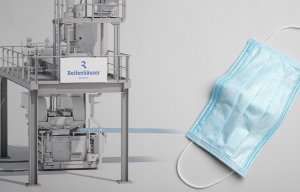
Reifenhäuser Reicofil shortens delivery for meltblown lines
The company will be demonstrating how companies can further develop their products with its current RF 5 and RF Smart technologies at K 2019.

8th July 2019
Innovation in Textiles
|
Troisdorf

Reicofil experts inspect nonwoven quality in Reifenhäuser technical centre. © Reifenhäuser
As a material for hygiene and packaging products, spunbonded fabric can help save up to 50% of the semi-finished material previously used, while simultaneously improving product properties.
Dr Andreas Rösner, Strategic Product Development at Reifenhäuser Reicofil, is an expert in sustainability and energy efficiency. “Our latest machine generation RF5 can produce nonwoven with attained quality. At Reifenhäuser we are continuously working to enable our customers to manufacture innovative plastics extrusion products in a way that conserves resources,” he said. “Our lines equipped with BiCo-technology exactly fit to this claim.”
The company will be demonstrating how companies can further develop their products with its current RF 5 and RF Smart technologies at K 2019 in Düsseldorf, this October.
Reifenhäuser Reicofil supplies spunbond lines predominantly for the hygiene market. They can produce spunbonded fabrics and SMSs with minimum grammage, extraordinarily high homogeneity, and a very low, specific energy consumption, according to the manufacturer. In the Reicofil spunbond process, the conversion of granulate into nonwoven takes place in a single production step.
“Our Reicofil spunbond technology works with a closed cooling and stretching system. This means that the filaments only come into contact with the surrounding air just before their homogeneous discharge,” explained Dr Rösner.
Using a higher proportion of recycled materials in the product perfectly combines cost efficiency and ecological sustainability. “At Reifenhäuser, we do our part to support the circular economy. Of course, a lot of attention is devoted to inline recycling capacities so that, at best, no waste is generated during production,” continued Dr Rösner.
“Using our technology, cleaned PET flakes made of post-consumer waste can directly be processed with no loss of quality in comparison to virgin material. Due to the fact that the line enables PETs and polyolefins to be processed, the potential product diversity is increased, and production costs and handling are hugely reduced. Our customers demonstrate the economical processability of recyclates, biodegradables and PCW-flakes with their innovative solutions.”
At its Troisdorf location, the company operates a large research and development centre for the nonwovens production. While their own lines continue production, customers can use the technology centre for their development, with the assistance of the Reicofil experts.
“With our cutting-edge RF 5 line technology and our expertise in extruder development, screw design, and production, we are the perfect partner for innovative spunbond products for the hygiene and packaging market – not only with PCW recycling,” stated Dr Rösner.

Business intelligence for the fibre, textiles and apparel industries: technologies, innovations, markets, investments, trade policy, sourcing, strategy...
Find out more